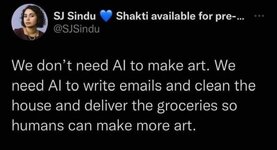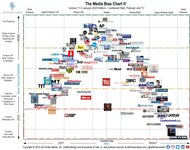Only if computers come up with something with literary merit that can't be differentiated (is that the right word?) from the real thing. Not sure they ever will. I'm fairly sure (or naïve) that computer generated books will always lack 'that something'; that creative thing, the imaginative, soulful, the mood. In the meantime, the average book buyer is capable of being discerning.
It's the readers who ultimately guide what the big 5 sell. If readers want churned out AI books, that's what the Big 5 will sell. But as long as readers want books with soul, the Big 5 will publish us (too).
The publishers will no doubt be the first to leap at AI generated works but I don't think they'll use it to dump us authors because they'd be cutting off a revenue stream by doing that. Computer books will be formulaic even if it reads as human generated. Some readers love formulaic books, and that's fine. That's that particular market. I don't write for that readership, hence it's not my competition and the publishers can go ahead and produce that for fast profits. But there will always be a market for real authors, (as long as humans don't become dumbed down). Publishers would be financially unwise to ignore that and go all out AI. As long as we have something people want to read, the 5 will sell it.
This whole AI thing might even be a good thing. Churning out books might generate interest in sales of more books (as in: what else do the Big 5 sell on their website? Oh look, a human written book.)
Also: AI might not make as much money as the publishers think, purely because of marketing. Authors create sales. Readers follow authors. Publishers would have to say this book is AI generated. In doing so, they may lose the buyers who want the 'real thing'. They'd end up selling to those who don't care, which is fine. Selling a faceless AI author would bring challenges. Readers like to follow individuals with their personalities and their lives. The Big 5 could 'create' fake authors, and get a cheap intern (don't get me started on that one!!) to create Ticktoks, Insta posts, and 'real' faces to interact with the readers online ... Problem will be though, AI can't do book signings, they can't do book tours, interviews and many of the other promotional in-person activities. The AI author won't be on Breakfast TV talking about the book with that sparkle of pride in their eyes that makes you want to go out and buy it. The sales revenue from AI books may not be that good because only the publisher does the marketing (and we can already see how they like doing that). ... Also, readers won't get the author 'evolvement' (no idea if this sensible English). Many authors change with time and readers probably like following those changes of style. Most readers want to engage with a real person who writes the books which they love.
And finally, authors can tap into the Zeitgeist and trends, and create new trends and new waves in books which the publishers can then sell. Will AI ever have the sensitivity to create a fashion which the Big 5 can sell?
Publishers will have shot themselves in the foot if your dystopian book future becomes reality.
So I think we will always have a corner of their business.
Oh, hey. If I'm wrong and the big 5 go all AI, I'll start a publishing company for only human authors which will be my USP. I'll let you know when I'm ready to receive subs.







